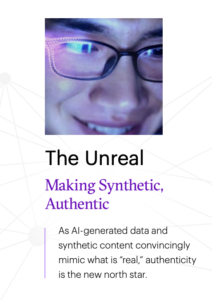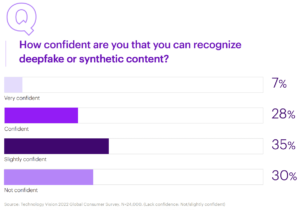[ad_1]
Accenture has launched its Accenture Expertise Imaginative and prescient 2022, a report inspecting key applied sciences beneath the theme “Meet Me within the Metaverse: The Continuum of Expertise and Expertise Reshaping Enterprise.”
The report combines enter from Accenture‘s Expertise Imaginative and prescient Exterior Advisory board (comprised of private and non-private sector consultants from academia, enterprise capital, and enterprise), in addition to interviews with business consultants and “a world survey of 24,000 shoppers and 4,650 C-level executives and administrators throughout 35 international locations and 23 industries.” It examines concurrent applied sciences like synthetic intelligence, internet 3.0, digital twins, edge computing, and quantum computing, and explores how they’re altering enterprise and the human expertise normally, all throughout the context of constructing the Metaverse.
The time period “metaverse” could also be an instantaneous turn-off for some, given its nebulous popularity as both the subsequent technological revolution akin to the IBM mainframe or the Web or an overhyped advertising and marketing fad destined to go the best way of Second Life. However in line with Accenture, it’s “an evolution of the web that permits a person to maneuver past shopping to inhabiting and/or taking part in a persistent shared expertise that spans the spectrum of our actual world to the absolutely digital and in between,” and the event of metaverse know-how is accelerating the convergence of those bodily and digital worlds, or the “actual” and the “unreal.”
The report’s authors discover the idea of the “unreal” by means of dialogue of synthetic intelligence and the way “companies and environments are more and more supported by AI-generated information that convincingly displays the bodily world.” This compelling mimesis, powered by deepfakes and different generative AI applied sciences, forces us to query what’s actual or not, and in what circumstances will we care, or not? They provide the instance of a video of the President and the way its authenticity issues extra when it’s on the information, however much less when it’s a deep faked Doritos business. This cloudy notion of actuality is termed “artificial realness,” about which the report says, “As artificial realness progresses, conversations about AI that align good and dangerous with actual and pretend will shift to focus as a substitute on authenticity.”
Synthetic intelligence is driving that artificial realness by way of artificial information. Accenture says using AI was as soon as a aggressive benefit for companies staying forward of tech developments, however it’s now a necessity in a data-soaked world the place unlocking its insights is essential for streamlining enterprise processes, smoothing out the client expertise, and inspiring larger outcomes. With the intention to accomplish these objectives, many corporations are coaching AI fashions with a mix of actual and artificial information.
In a June 2021 report, Gartner defines artificial information as information that’s generated by easy guidelines, statistical modeling, or simulation, versus real-world information gathered from direct measurement of enterprise processes. Accenture’s report cites Gartner’s prediction that almost all information utilized in AI modeling can be artificial by 2030. It attributes this to the truth that “artificial information is getting used to coach AI fashions in ways in which real-world information virtually can not or mustn’t. This reasonable but unreal information may be shared, sustaining the identical statistical properties whereas defending confidentiality and privateness, and it may also be made to have elevated variety and to counter bias, thus overcoming the pitfalls of real-world information.” The report additionally discusses how artificial information is being made extra “humanlike” for the needs of creation and interplay, which might help customers save time and work, particularly in growth or customer support contexts.
Primarily based on the existence of troll farms, deepfakes, and phishing scams, it’s unsurprising that technological development usually attracts opportunistic and malicious customers who illegally exploit these new instruments. The report acknowledges there can be downsides to the rise of artificial information use, together with some issues already coming into play like the dearth of belief in data sources (solely 35% belief what they learn on social media, as surveyed by the Edleman Belief Barometer) and extreme mistrust of the know-how sector normally. AI-powered bots and troll farms are reaching thousands and thousands with propaganda and false data, for instance, 25% of local weather crisis-related tweets and 38% of common “pretend science” tweets have been from bots in a research finished by Brown College. Moreover, a Carnegie Mellon research discovered that between 45% to 60% of accounts tweeting about COVID-19 are bots. Accenture calls this state of affairs an “infodemic” and says it may proceed to worsen with AI’s evolution and the continuation of “disinformation-as-a-service.”
“As there may be increasingly more convincing and alluring disinformation, what’s actual will develop into more and more murky,” Accenture says. “Not solely will risk actors be capable of trigger direct harm to companies and their reputations, however they might undermine belief within the AI ecosystem on which companies are actually constructed.”
No matter potential pitfalls, that are too quite a few to debate on this brief article, AI, particularly generative AI, is right here to remain. The report says that “73% of worldwide shoppers assume that over the subsequent three years, the variety of instances they work together with AI or AI-generated content material will enhance.” So, what may be finished to make these interactions much less dangerous?
Relatively than fixating on what’s “actual,” Accenture proposes authenticity because the “new compass,” which they outline as being true to oneself and real in a manner that others can attest to – and extra concretely, utilizing generative AI in an genuine manner means taking heed of provenance, coverage, folks, and function.” Distributed ledger know-how might help with provenance of digital content material. For instance, Venture Origin, a Microsoft-led collaboration is utilizing it to diffuse disinformation’s unfold. Coverage surrounding generative AI might help, similar to California’s BOT Disclosure Legislation, “which states that one should disclose using a bot when they’re utilized in communication to promote items or providers or affect a vote in an election,” in line with the report. Enabling the fitting folks can help in authenticity as properly, and organizations must be organized with governance constructions for elevated accountability and experience ought to a disinformation or phishing marketing campaign happen. Lastly, function comes into play with deciding one of the best use for generative AI. The report says utilizing a bot as a substitute of an individual for customer support roles with the only function of saving cash is more than likely missing in authenticity. Nonetheless, in a state of affairs the place prospects could also be embarrassed or hesitant to speak to a dwell individual, similar to within the healthcare or magnificence industries, an AI “individual” may be preferable, which Accenture says can be an genuine option to enhance worth for the buyer.
Accenture concludes its report’s part on the “unreal” by admitting that the rising use of artificial information for AI fashions may both enhance the world or depart it susceptible to malicious actors, however actuality will most likely see it land someplace in between. The corporate reiterates authenticity as a “compass and framework that may information your organization to make use of AI in a real manner – throughout industries, use circumstances, and time – by contemplating provenance, coverage, folks, and function.”
Learn the complete report right here.
Associated Gadgets:
Artificial Knowledge: Typically Higher Than the Actual Factor
Faux Knowledge Involves the Forefront
Knowledge Science and AI Predictions for 2022
The publish Accenture Report Explores the ‘Unreal’ World of Artificial Knowledge and Generative AI appeared first on Datanami.
[ad_2]




